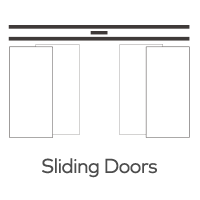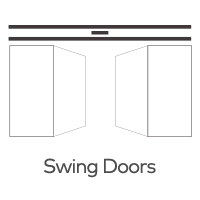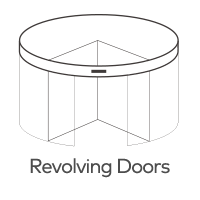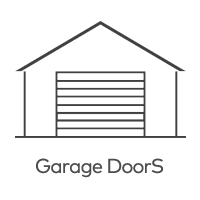Comment les capteurs laser dans les portes automatiques améliorent-ils l'accessibilité des personnes handicapées?
Les capteurs laser ont révolutionné l’accessibilité des portes automatiques, améliorant considérablement la vie des personnes handicapées. Ces capteurs avancés, qui utilisent des faisceaux lumineux pour détecter le mouvement et la présence, offrent une gamme d’avantages qui améliorent la commodité, la sécurité et l’indépendance des personnes ayant des besoins de mobilité divers.
Principaux avantages des capteurs laser dans les portes automatiques
1. Les capteurs laser permettent aux portes d'ouvrir automatiquement sans avoir besoin de toucher manuellement, réduisant ainsi l'effort physique nécessaire pour les personnes ayant une mobilité ou une dextérité limitées.
Réduit la propagation des germes: Dans les espaces publics, le fonctionnement mains libres minimise le contact avec les surfaces, contribue à une meilleure hygiène et réduit le risque d'infection.
2. Détection fiable:
Détection précise: Les capteurs laser détectent avec précision la présence d'individus, même ceux avec des fauteuils roulants, des marcheurs ou d'autres dispositifs d'assistance, assurant un fonctionnement sans heurt et en douceur de la porte. Répondant à différentes vitesses: Ces capteurs peuvent s'adapter à différentes vitesses de marche, accueillant des personnes ayant des niveaux de mobilité différents.
3. Sécurité améliorée:
Détection des obstacles: les capteurs laser peuvent détecter les obstacles dans l'entrée, empêchant la porte de se fermer sur des personnes ou des objets, minimisant le risque d'accidents. Fermeture douce: En cas d'obstruction, la porte peut être programmée pour s'ouvrir ou se fermer lentement, ce qui permet un passage sûr.
4. Amélioration de l'accessibilité dans divers environnements:
Utilisation intérieure et extérieure: Les capteurs laser conviennent à la fois pour les installations intérieures et extérieures, ce qui les rend polyvalents pour divers milieux, y compris les bâtiments publics, les hôpitaux et les complexes résidentiels. Adaptabilité aux différents types de portes: Ces capteurs peuvent être intégrés dans différents types de portes, tels que les portes basculantes, les portes coulissantes et les portes tournantes, répondant à divers designs architecturaux.
5. Efficacité énergétique:
Fonctionnement optimisé de la porte: les capteurs laser peuvent être programmés pour ajuster les temps d'ouverture et de fermeture de la porte en fonction des niveaux d'occupation, réduisant la consommation d'énergie et minimisant la perte ou le gain de chaleur.
Avantages spécifiques pour les personnes handicapées
Utilisateurs de fauteuils roulants: Les capteurs laser facilitent l'entrée et la sortie en douceur, éliminant la nécessité d'utiliser la porte manuellement, ce qui peut être difficile pour les personnes ayant une force supérieure limitée. Personnes ayant une déficience visuelle: Ces capteurs peuvent être combinés avec des indices sonores ou des indicateurs tactiles pour guider les utilisateurs vers la porte et signaler quand elle est sur le point d'ouvrir ou de fermer. Personnes ayant des troubles cognitifs: les portes automatiques peuvent réduire la confusion et l'anxiété, car elles fonctionnent de manière indépendante, nécessitant un effort cognitif minimal pour l'utiliser. Personnes âgées: Les capteurs laser peuvent aider les personnes âgées ayant une mobilité réduite ou une dextérité réduite, offrant un moyen pratique et sûr de naviguer à travers les portes.
Avancées technologiques et possibilités futures
Capacités de détection avancées: Les nouveaux capteurs laser offrent des capacités de détection améliorées, y compris la capacité de différencier entre personnes et objets, améliorant encore la sécurité et l'efficacité. Intégration avec les systèmes de bâtiment intelligents: Ces capteurs peuvent être intégrés avec les systèmes de bâtiment intelligents, permettant la surveillance à distance, le contrôle et l'entretien des portes automatiques. Fonctionnalités de personnalisation et d'accessibilité: Les développements futurs peuvent inclure des paramètres personnalisables pour répondre aux préférences et aux besoins individuels, tels que l'ajustement des niveaux de sensibilité ou l'ajout de fonctionnalités d'accessibilité spécifiques.
Conclusion
Les capteurs laser ont considérablement contribué à améliorer l'accessibilité des personnes handicapées en rendant les portes automatiques plus conviviales, sûres et efficaces. À mesure que la technologie continue d'avancer, nous pouvons nous attendre à de plus grandes innovations dans la technologie des capteurs, améliorant encore l'accessibilité et l'inclusion des environnements construits pour les personnes de toutes capacités.







